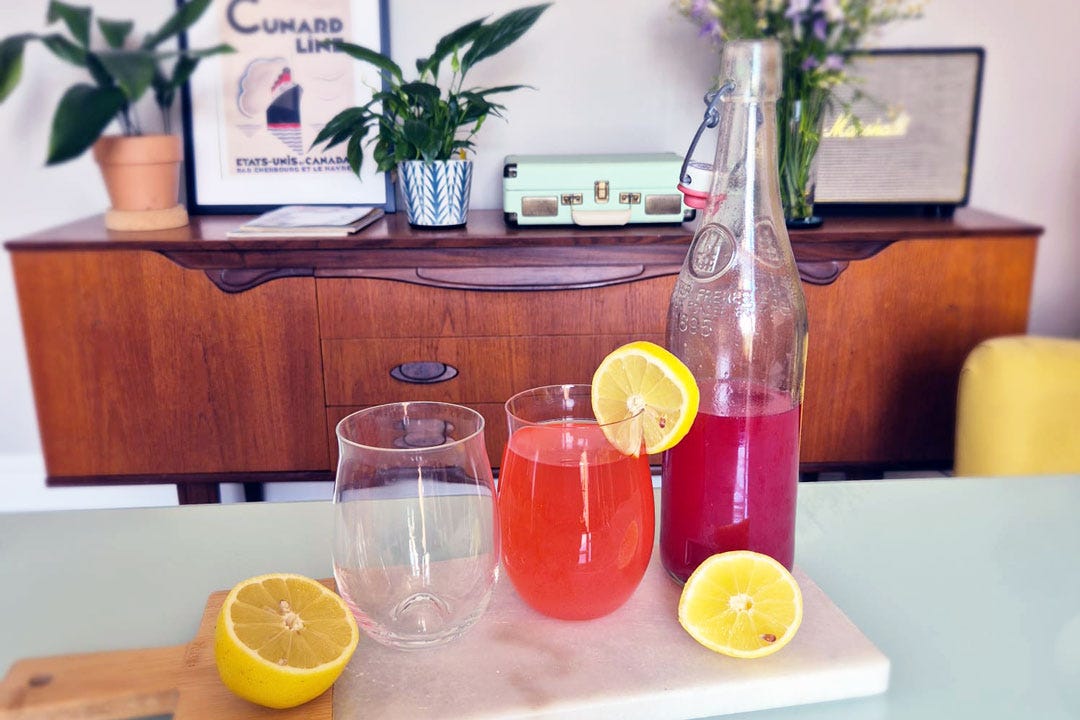Fruits of summer
Raspberry and lemon cordial recipe
It’s been a busy few weeks of travel for me with visits to northern Spain and Portugal for National Geographic Traveller magazine among others. In Asturias, on the Cantabrian coast, I was reminded once again of the similarities between the region and Wales. Asturias has a history of coal mining, steel production, farming and fishing, and the climate is quite rainy meaning glorious green mountains and countryside. The food also has moments of comforting familiarity. Pote – the oldest of Asturian dishes – is a slow-cooked stew of potatoes and vegetables and some beans, along with some bits of beef and pork. A lot like the origins of cawl, it’s traditional to serve the broth and meat separately and it was designed as a dish of necessity and availability.
I also visited a berry farm, something I haven’t done in Wales since I was a child. The sort of place that you can pick your own punnet. Pablo the owner told me how wild berries used to proliferate in the Asturian countryside, but they are much harder to come across now. It’s one of the reasons he and his wife started the farm to begin with. I couldn’t help but select a few of the plump blackberries and blueberries, and sample their homemade fruit ice cream. I love summer fruits and a good forage on a hedgerow.
In all my 80+ Welsh cookbooks, there’s usually a section for drinks and many of them call for the scents and tastes of summer, such as elderflower. They are used to make wines and cordials in the old tradition of using what’s in season and preserving it for other times of year.
“Flowers played a part in cookery in Wales, as elsewhere, as a source of flavour and colour before the arrival of chemical agents. Marigolds, violets, roses, tansies and elderflowers were the most commonly used: marigolds for their pungent flavour (in Wales they floated the flower-heads on top of the cawl) and their yellow colour (a few marigold petals would effectively colour a custard or a cheese or a second-grade butter); violets went into creams and puddings to impart both flavour and colour. The scent a flavour of elderflowers is so powerful that a bunch of them drawn through any fine jam before bottling would flavour and scent it most deliciously, while the simply made elderflower wine, which the bouquet of German white wines echo more delicately, was employed to flavour junkets, cakes and light puddings. Country women in Wales today recall these practices and many still employ them.
Home-made wines and home-brewed beer played a significant role in the social life of the Welsh countryside for longer than they did in England, because tea, which replaced buttermilk and the home-produced beverages, was slower to win acceptance in Wales than it was in England. The hedgerows and moorlands provided a useful harvest of wild fruits and berries – whinberries, wild raspberries, cranberries, blackberries, crab apples and medlars – which came to the table in simple pies and puddings.” Traditional Food in Wales (1997), Bobby Freeman
I love this 1965 archive clip from the BBC where we meet Richard Batten, from Llanfihangel near Newbridge-On-Wye, and he tells us about what he makes from his foraged bounty.
The Recipe
Raspberry and lemon cordial
I’ve spoken before about how much I love a drop of squash, but I’ve never really thought of making cordial. That was until I stumbled upon some on-their-way-out raspberries (forever a bargain hunter) at my local greengrocers. I thought I’d give it a go and this is the result. A refreshing taste of summer in a glass. I’ve also diluted it with sparkling wine and it’s just as good if not better than water!
Ingredients
150g raspberries
2 large lemons
250g caster sugar
400ml water
Method
Peel the lemons using a potato peeler and pop the shavings into a saucepan, along with the raspberries, water and sugar.
Juice the lemons and add the juice to the pan.
Bring to the boil and then simmer for 10 minutes or so mashing down the raspberries.
Pour through a fine sieve or muslin squeezing out any excess.
Put the strained liquid back in the pan and boil again until it reduces slightly and gets thicker.
Store in a sterilised bottle or jar.
Dilute one part cordial to five parts water or to your taste.
If you try the recipe out, don’t forget to tag any photos with #mywelshkitchen.
The Playlist
To me, cooking and music go hand in hand, whether that’s singing at the top of your voice using a wooden spoon as a microphone while waiting for pasta to boil, or dancing around with the oven gloves on as the oven timer counts down. Here are some ideas for your Welsh Kitchen playlist.
We’ve lost two great Welsh singers recently, Stuart Burrows and Iris Williams. Stuart was born in Cilfynydd in Rhondda Cynon Taf, and had a magnificent career in opera across the world as well as his own TV show among other things. Iris was born in Pontypridd in Rhondda Cynon Taf, and was hugely successful also having her own TV show and performing across the world.
Myfanwy – Stuart Burrows
I hear you calling me – Stuart Burrows
He was beautiful – Iris Williams
Pererin Wyf – Iris Williams and Rhys Meirion
Ross recommends
Matsudai Ramen x Halen Môn
One of the best things to come out of the pandemic has to be Matsudai Ramen’s make-at-home kits. They were lauded and rightly so. I recently got sent their latest one, which is a collaboration with my favourite salt brand Halen Môn. The deep, rich broth is divine, and the kit contains golden chicken chintan and seafood dashi double-soup with Halen Môn shio tare, wild garlic oil, custom wavy noodles, braised pork loin chashu, menma, and spring onions. You can also opt to include a seasoned ajitama egg. It’s really easy to put together and it’s like a warm hug in a bowl.
Can you help?
London Welsh School fundraising
Ysgol Gymraeg Llundain has been providing bilingual Welsh/English education in London for nearly 70 years, although the teaching of Welsh in London dates back much further – a Welsh school was founded in Clerkenwell 300 years ago as a charity school for poor Welsh children in London. The current school in Hanwell receives a small grant from the Welsh Government to help sustain the school. This funding is now only promised until the end of the school year 2026. Without this funding, the school will not be able to remain open. You can help by signing the petition to ensure that the Welsh government maintains this grant, and you can also donate to school.
Wine time
There are still a few tickets left for my wine tasting at the London Welsh Centre tomorrow night. We’ll be tasting my choice of supermarket wines for summer.
From the archive
What makes food taste great?
Have you ever made something that just doesn't taste quite right? Perhaps you've followed the recipe to the letter, or you've thrown together some leftovers, and while what you've made is perfectly fine, it's just that… fine. There’s something missing, but you can't quite put your finger on what that is. It tastes good, but not great.
The legend of Jemima Fawr – the Welsh heroine
There are some tales and stories that always stay with you – be they legend and myth or historical fact. One such story that sticks in my mind is that of Jemima Nicholas, also known as Jemima Fawr (Jemima The Great).
A fish shop supper
“We’re having a fish and chip from the fish shop” is how my Nannie Gwen would describe getting a take-away bag of chips from the chip shop – if that’s what you call it. Fish shop (merging into a single word) just seems to have sunk into my vocabulary as the name of the place, but I still don’t talk about fish and chip in the singular, as my nan did. I s…









